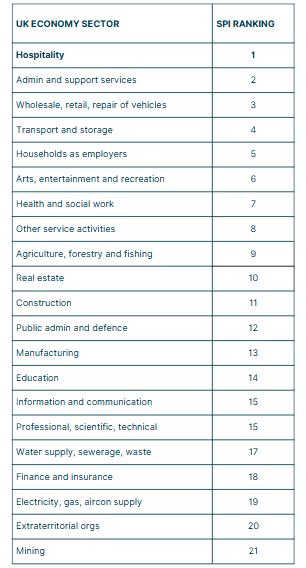
Download the Index

The Social Productivity Index (SPI) is a new way to measure growth.
When politicians talk about economic success, they almost always talk about GDP and economic productivity. These concepts can feel remote from most people – you can’t spend GDP in your local shop – but as importantly, they don’t capture an awful lot of the positive economic and social impact that a sector can have.
It has meant that vital sectors like hospitality, so important to creating places where people want to live, work and invest, are often forgotten in policymaking.
That is why we need a new way of thinking about growth, which balances raw economic productivity with broader social productivity which brings opportunities for all. We believe we need to make sure that growth is resilient, that it is available across the regions and nations of the UK, and that brings change and opportunity across different social groups.
Our new Social Productivity Index introduces a broader definition of a successful economy, ranking industries based on their ability to share growth widely
The SPI brings together a robust evidence base showing that foundation sectors like hospitality, retail and logistics not only directly support the success of our ‘growth driving’ sectors but deliver broader socially productive growth. These sectors are better employers of school leavers, the strongest route into management for non-graduates, and are uniquely geographically dispersed. Where the ‘growth driving’ sectors often hire narrowly and in limited parts of the country, the foundation sectors offer careers everywhere, to everyone.
Why socially productive growth matters to your business
Hospitality leaders often tell us that they believe politicians and others ignore the broad economic and social value of their business. That failure to see the total value of hospitality may be part of the reason successive governments have failed to support the sector with tax and regulatory policy.
This Social Productivity Index can help us to change that view, and get the policy changes your business needs to thrive.
We are asking members to send the index to their MP, using our easy tool below.
Hospitality is the top performing most socially productive sector in the economy
In this first Social Productivity Index, hospitality is the overall top performing sector with the highest average ranking across the 12 areas measured.
It leads a group of foundation economy sectors including administration, retail and transportation which emerge as vital socially productive employers with consistent high performance. By contrast it is clear that the sectors which have the highest raw economic productivity, and which have consistently been the bedrock of Government industrial policy, often perform less well on social productivity measures, with the benefits of growth left inaccessible to many people.
Hospitality's social impact

Economic impact
Hospitality grew at above the economic average for the ten years before and four years after the pandemic, highlighting its status as a resilient and fast-growing sector. Despite being significantly impacted by the pandemic the hospitality sector continues to be in the top half of sectors for economic growth.
Today, it is the 13th largest sector in the UK economy by GVA, larger than automotive, pharmaceuticals and aerospace combined.
Geographic impact
Hospitality is present across the UK as one of the top quarter of most geographically dispersed sectors, creating jobs and growth in each region.
Social impact
Hospitality performs exceptionally well as a socially accessible and socially mobile employer, offering economy-leading routes into work and leadership roles. It employs people with disabilities and offers flexible and part time work allowing staff to balance their jobs with other commitments. On this measure, hospitality is the highest performing sector in the UK economy.
It is also particularly important as an employer of people whose parents worked in non-professional or managerial roles, or who themselves are not graduates. That commitment to social mobility continues after hire, with only two sectors having a higher percentage of managers without degrees.




